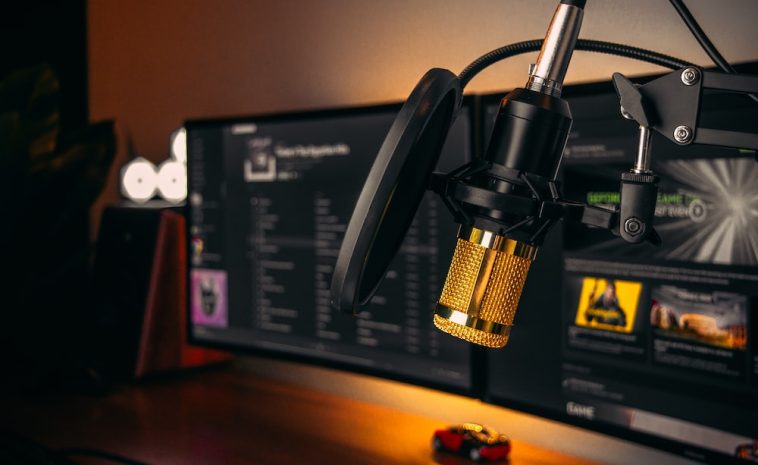Introduction.
Podcasts have gained immense popularity in recent years, and with their rise, there has been an increasing demand for skilled podcast editors.
As a podcast editor, you play a crucial role in shaping the audio quality, flow, and overall production of a podcast.
If you have a passion for audio production and storytelling, becoming a podcast editor can be a fulfilling and rewarding career choice.
In this introduction, we will explore the steps and skills required to become a podcast editor.
From understanding the editing process to honing your technical expertise and cultivating a keen ear for audio quality, we will delve into the essential aspects of this role.
Whether you are an aspiring editor or looking to enhance your existing skills, this guide will provide you with valuable insights to kickstart your journey in podcast editing.
To become a successful podcast editor, you must first grasp the fundamentals of audio editing software. Popular tools in the industry include Adobe Audition, Audacity, GarageBand, and Reaper.
Familiarize yourself with these software options, learn their features, and develop proficiency in editing techniques such as trimming, fading, equalizing, and noise reduction.
Collaboration and effective communication are also essential traits for a podcast editor. You will work closely with podcast hosts, producers, and sometimes a team of sound engineers or other editors.
Being able to understand and implement the vision of the podcast while effectively communicating your ideas and suggestions is crucial for delivering high-quality episodes.
Becoming a podcast editor requires a combination of technical proficiency, storytelling sensibility, and effective collaboration skills.
By mastering the art of audio editing, understanding the narrative structure, staying updated with industry trends, and building a robust portfolio, you can embark on a successful career in podcast editing.
So, if you are ready to dive into the world of audio production and help shape captivating podcast experiences, let’s explore the skills and steps needed to become a podcast editor.
What Is a Podcast?
A podcast is a digital audio or video program that is typically released in a series of episodes. It is similar to a radio or television show but is available on-demand and can be accessed and downloaded from the internet.
Podcasts cover a wide range of topics, including news, education, entertainment, storytelling, interviews, and more.
Podcasts are designed to be portable and convenient, allowing listeners to enjoy content whenever and wherever they choose.
They can be accessed through dedicated podcasting platforms or apps on smartphones, tablets, or computers. Subscribing to a podcast allows listeners to automatically receive new episodes as they are released.
Podcasts offer a unique form of content consumption. They provide an immersive and intimate experience, often featuring engaging hosts or experts who share their knowledge, perspectives, and stories.
Listeners have the flexibility to listen to podcasts during their commute, while exercising, or during any other activity, making it a popular medium for entertainment and learning.
One of the key features of podcasts is their episodic nature. Shows are typically released on a regular schedule, such as weekly or biweekly, with each episode building upon the previous ones.
This format allows for ongoing narratives, in-depth discussions, or the exploration of a specific theme or subject matter over time.
Podcasts have gained immense popularity in recent years due to their accessibility, diverse range of content, and the ease of creating and distributing them.
They offer a platform for individuals, organizations, and experts to share their expertise, passions, and stories with a global audience. With thousands of podcasts available on various topics, there is something for everyone’s interests and preferences.
Whether you’re looking to stay informed, be entertained, learn something new, or simply enjoy engaging conversations, podcasts provide a rich and engaging medium for audio or video content.
So grab your headphones, subscribe to your favourite podcasts, and embark on an exciting journey of audio storytelling and knowledge exploration.
Why Should I Start a Podcast?
Podcasting has experienced a remarkable surge in popularity in recent years, and it’s not difficult to see why.
With millions of people tuning in to podcasts daily, this medium offers unique opportunities for both creators and listeners.
If you’ve been contemplating whether to start a podcast of your own, here are compelling reasons why you should take the leap and embark on this exciting audio adventure.
1. Share Your Passion and Expertise.
Podcasts provide a platform for you to share your knowledge, insights, and experiences with the world.
Whether you’re an expert in a particular field, a hobbyist with a deep passion, or someone with a unique perspective to offer, podcasting allows you to engage with an audience that shares your interests.
It’s an excellent opportunity to showcase your expertise, build credibility, and connect with like-minded individuals.
2. Build a Community.
Podcasts have a remarkable ability to create communities around shared interests. By starting a podcast, you have the opportunity to bring people together, foster meaningful discussions, and establish connections with your audience.
Your podcast can become a gathering place for people who resonate with your message, creating a supportive and engaged community that extends beyond the audio content.
3. Amplify Your Voice.
In a world saturated with information, podcasting allows you to stand out and be heard. You have the freedom to express your thoughts, ideas, and opinions in your authentic voice.
Whether you want to entertain, educate, inspire, or challenge the status quo, podcasting gives you a powerful platform to communicate with a wide audience and have a meaningful impact on their lives.
4. Explore Creative Expression.
Podcasts offer creative freedom and flexibility. You can experiment with different formats, storytelling techniques, and production styles to create a unique and captivating audio experience.
Whether it’s through interviews, solo episodes, narrative storytelling, or panel discussions, you have the creative control to craft a podcast that reflects your vision and resonates with your audience.
5. Learn and Grow.
Hosting a podcast is not just about sharing your knowledge; it’s also an opportunity for personal growth and continuous learning.
Through research, interviews, and conversations with guests or co-hosts, you’ll expand your knowledge, deepen your understanding of various topics, and develop valuable communication and interviewing skills. Podcasting can be a journey of self-discovery and personal development.
6. Monetization Potential.
While not the primary motivation for starting a podcast, it’s worth mentioning that podcasts offer monetization opportunities.
As your podcast grows in popularity and attracts a dedicated audience, you can explore avenues such as sponsorships, advertising, merchandise sales, crowdfunding, or even creating premium content or courses.
While it requires dedication and consistent effort, podcasting can potentially become a source of income or open doors to other opportunities.
7. Join a Thriving Medium.
Podcasting is a thriving medium with a diverse and engaged listener base. By entering this space, you become part of a vibrant community of podcasters and listeners, with countless opportunities for collaboration, networking, and cross-promotion.
Podcasting offers a unique blend of intimacy, convenience, and storytelling that has captured the attention of millions worldwide.
8. Expand Your Network.
Podcasting opens doors to connect with a diverse range of individuals within your industry or niche. Through interviews, collaborations, and networking opportunities, you can build relationships with experts, thought leaders, and influencers.
These connections can lead to exciting opportunities for growth, exposure, and even partnerships that extend beyond your podcast.
9. Develop Communication Skills.
Hosting a podcast is an excellent way to enhance your communication skills. As you navigate conversations, conduct interviews, and engage with your audience, you’ll develop the art of active listening, effective questioning, and articulating your thoughts clearly.
These skills are valuable not only for podcasting but also for various aspects of personal and professional life.
10. Leave a Lasting Legacy.
Podcasts have the unique quality of leaving a lasting legacy. By recording your thoughts, experiences, and insights, you create a digital archive of your voice and ideas.
Your podcast becomes a time capsule that can be revisited by your audience and future generations. It’s a powerful way to make a meaningful contribution and leave a lasting impact on the world.
11. Enjoy the Creative Process.
Podcasting is a creative outlet that allows you to unleash your imagination and produce content that resonates with you and your audience.
From brainstorming ideas, scripting episodes, recording, editing, and adding music or sound effects, the entire process can be incredibly fulfilling and enjoyable.
It provides a space for self-expression and creativity that can be a rewarding and satisfying endeavour.
12. Have Fun.
Last but certainly not least, podcasting should be fun! It’s an opportunity to engage in conversations, explore topics you’re passionate about, and connect with others who share your interests.
The joy and fulfilment that come from creating and sharing content can be immensely gratifying. Embrace the journey, embrace the process, and enjoy every moment of your podcasting adventure.
How Do I Become a Podcast Editor?
As a podcast editor, you play a critical role in shaping the audio quality, flow, and overall production of a podcast.
If you have a passion for audio production and an ear for detail, becoming a podcast editor can be a fulfilling and rewarding career choice.
In this article, we will guide you through the steps and skills required to become a podcast editor and excel in this exciting field.
1. Develop Technical Expertise.
To become a podcast editor, you must first gain proficiency in audio editing software. Popular tools used in the industry include Adobe Audition, Audacity, GarageBand, and Reaper.
Invest time in learning these software options, understanding their features, and becoming proficient in editing techniques such as trimming, fading, equalizing, and noise reduction.
Practice manipulating audio tracks, layering sound effects, and integrating music to create a polished and professional sound.
2. Learn the Art of Storytelling.
Podcasts are all about storytelling, and as a podcast editor, you need to understand narrative structure and pacing. Study successful podcasts across different genres to grasp storytelling techniques.
Learn to identify compelling moments, create smooth transitions between segments, and maintain a consistent flow throughout the episode.
Pay attention to the podcast’s tone, style, and overall vision, and ensure that your editing enhances the storytelling experience for the listeners.
3. Hone Your Listening Skills.
Developing a keen ear for audio quality is crucial as a podcast editor. Train yourself to detect background noise, pops, clicks, and audio inconsistencies.
Learn to eliminate distractions and focus on the details that matter. Familiarize yourself with audio mixing techniques to achieve a balanced sound and ensure that voices and music are clear and intelligible.
Regularly practice critical listening by comparing your work to professional podcasts and seeking feedback from mentors or peers.
4. Collaboration and Communication.
Podcast editing is often a collaborative process, involving close coordination with podcast hosts, producers, and other team members.
Effective communication skills are essential to understand the podcast’s goals and vision and translating them into the final edited product.
Actively engage with the creative team, share your ideas and suggestions, and be open to feedback and revisions.
Developing strong collaborative relationships will not only enhance the quality of your work but also open doors to new opportunities.
5. Stay Updated with Industry Trends.
The podcasting industry is continuously evolving, and it’s essential to stay informed about the latest trends, techniques, and industry standards.
Attend industry events, join online communities, and participate in workshops or training programs to learn from experienced professionals.
Stay updated with advancements in audio technology, emerging podcasting platforms, and evolving listener preferences.
Embrace continuous learning and experimentation to refine your skills and stay ahead in the competitive podcast editing landscape.
6. Build Your Portfolio.
A strong portfolio is crucial for establishing yourself as a reputable podcast editor. Start by offering your services to aspiring podcasters, friends, or local businesses. Collaborate on small projects to gain experience and showcase your skills.
As you accumulate edited episodes, create a website or an online platform to showcase your work.
Highlight your expertise, include testimonials or reviews from satisfied clients, and provide a clear means for potential clients to contact you.
A well-curated portfolio will serve as your calling card and help you attract new opportunities.
7. Network and Collaborate.
Networking is crucial for advancing your career as a podcast editor. Connect with other professionals in the industry, attend podcasting conferences or meetups, and join online communities and forums.
Engage in conversations, share your expertise, and seek opportunities for collaboration. Collaborating with podcast hosts, producers, or other editors can expand your network, expose you to different styles and genres, and provide valuable learning experiences.
Building strong relationships within the podcasting community can lead to referrals and new projects.
8. Seek Feedback and Continuously Improve.
Feedback is invaluable for growth as a podcast editor. Seek feedback from clients, mentors, or peers to gain insights into your strengths and areas for improvement.
Actively listen to constructive criticism and use it as an opportunity to enhance your editing skills. Stay open-minded, embrace new techniques and approaches, and consistently strive to refine your craft.
Taking on challenging projects and pushing your creative boundaries will contribute to your professional development.
9. Specialize and Diversify.
Consider specializing in a particular niche or genre of podcasting to differentiate yourself in the market.
Whether it’s true crime, business, technology, or storytelling podcasts, becoming an expert in a specific area can attract clients who value your specialized knowledge and understanding of their target audience.
Additionally, explore different types of podcast editing, such as narrative-driven storytelling, interview-based shows, or highly produced narrative fiction podcasts.
Diversifying your skill set will make you more versatile and adaptable to various client needs.
10. Stay Organized and Efficient.
Podcast editing often involves managing multiple projects simultaneously. Develop organizational systems to keep track of deadlines, client preferences, and project files.
Utilize project management tools, create templates for repetitive tasks, and establish efficient workflows to streamline your editing process.
Time management and effective communication with clients are crucial for delivering high-quality work within specified timelines.
Conclusion.
Becoming a podcast editor requires a combination of technical expertise, storytelling sensibilities, collaboration skills, and a commitment to continuous improvement.
By developing proficiency in audio editing software, honing your listening skills, understanding the narrative structure, staying updated with industry trends, building a strong portfolio, and networking with professionals in the field, you can pave your way to a successful career as a podcast editor.
Embrace the creative opportunities and challenges that come with podcast editing, and let your passion for audio production and storytelling shine through in every episode you edit.





GIPHY App Key not set. Please check settings